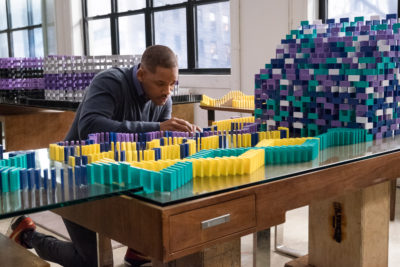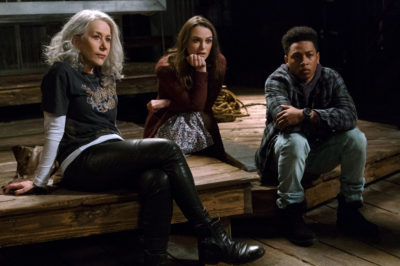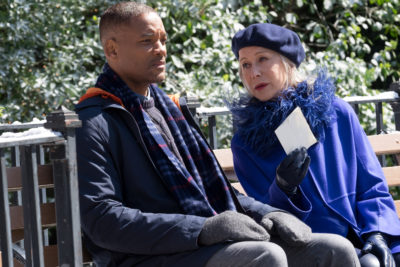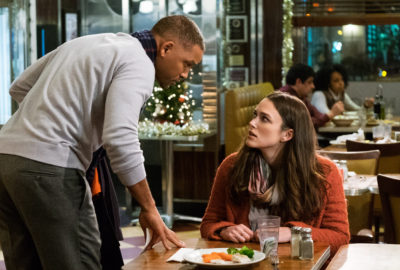
Collateral Beauty is a story about grief, recovery and redemption – themes also found in Kenneth Lonergan’s brilliant Manchester By Sea. It angered me because it appeared to be an entirely different movie than the one suggested by the trailers – and by being a remarkably treacly film on its own merits.
When brilliant ad man Howard (Will smith) loses his six-year old daughter, it breaks everything about him – his marriage, his work, his spirit. He becomes a recluse when he’s not at work and even when he’s at work, he’s not there –instead building complicated domino gags and knocking them down again.
His brilliance as an ad man is encapsulated in the concept that every man, woman and child on the planet is connected by three concepts – Love, Time, and Death. That’s all we ever know about his work – we never actually see him apply beyond a staff pep talk in the film’s opening moments.

Then we’re suddenly in the future – where he’s either totally emotionless (jaw jutting, teeth clenched) or depressed (sad eyes, furrowed brow). Besides domino gags, he only does a few other things: sit in a dog park (he has no dog); occasionally peer through the window at a grief support group, and write letters to those three abstractions – Love, Time and Death.
The company he owns with three partners – Whit (Edward Norton), Claire (Kate Winslet) and Simon (Michael Peña) – is sinking fast but there might be a way for the partners to salvage something if they can persuade Howard to agree to sell.
The trio hire a private eye, Sally Price (Ann Dowd, criminally underused), to find some evidence that he’s not competent, which leads to their discovering his few pastimes. They then try to bring him back to the land of the living by hiring three actors – Brigitte (Helen Mirren), Amy (Keira Knightley) and Raffi (Jacob Lattimore) – to play those abstractions in the hope that they will shock him back to his sense.

When they fail, the partners then persuade their actors to make one more appearance – which Price records. The plan is to erase the actors from the videos and make it look like Howard is nuts – then they can sell without needing his approval.
The big plot twist is that each of the partners has a secret problem – Whit has been divorced because he cheated on his wife, and now his daughter hates him; Kate gave up her social life to make the company work and her biological clock is running out, and Simon has one of those movie diseases that let him remain impossibly good looking while killing him.
This is not the movie the trailers suggested. Not even close – or so it seemed.
Even if the film had delivered exactly what the trailer promised, it does so with such awkwardness that it would have lost even then. It doesn’t give us nearly enough of the pre-loss Howard to make that loss feel real – and even if it did, learning about that loss so early in film is depressing enough to take anyone out of the story.

Considering that director David Frankel is the man who directed The Devil Wears Prada, you’d think he’d have a defter touch – and the smarts to realize that the script (by Just Go With It’s Allan Loeb) is just not in the same class as Devil.
Instead, we have a film that forces awkward connections (guess who runs that grief support group); is practically the perfect example of obvious manipulation (yes, all movies manipulate – the good ones just don’t make it obvious), and is so predictable it hurts.
I hated this movie – I’d much rather see the one promised in the trailers.
Final Grade: D-
Photos by Barry Wetcher/Courtesy of Warner Bros.